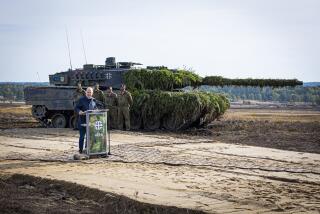Iraq’s at It Again: Will It Never Change? : Need for U.N. caution in arms monitoring is reaffirmed
- Share via
Iraq’s latest exercise in military posturing and provocation along its border with Kuwait comes, surely by no coincidence, just as its diplomatic efforts at the United Nations to have the economic sanctions against it lifted are nearing a climax.
For the last two weeks Iraq’s deputy prime minister, the smooth, voluble and perennial Tarik Aziz, has been waging what some drolly describe as a “charm offensive” aimed at generating support for ending the sanctions, which were imposed after Iraq invaded Kuwait in 1990.
Later this month the Security Council is scheduled to hear from Rolf Ekeus, who heads the U.N. commission that is supposed to make sure Iraq no longer builds or is hiding nuclear, chemical or biological weapons, or missiles to deliver them. Ekeus has overseen the construction of an elaborate monitoring system designed to detect Iraqi cheating. That system is to be tested for six months. If it’s found to work, and Iraq is found to be in compliance with U.N. resolutions, the Security Council will be asked to lift the sanctions.
Two weeks ago we wrote that, under the right conditions, lifting the sanctions would be in order. The key condition, of course, is close monitoring of the kind that the Ekeus commission has planned.
Additionally, we cited the need for Iraq to give up its spurious territorial claim to Kuwait and the need for it to accept permanent international monitoring of its imports so that it can’t secretly reacquire a threatening weapons capability. These conditions continue to be urgent. Now, however, fresh doubts have been raised about how effectively the whole of Iraq can be monitored by technical means. These put the sanctions issue in a new light.
In a recent speech CIA Director R. James Woolsey accused Iraq of “accelerating construction of deep underground shelters and tunnels to produce and store weapons of mass destruction.” A few days ago a CIA spokesman expressed concern that Iraq “is still hiding Scud missiles, chemical munitions and its entire biological weapons warfare program,” presumably in beneath-ground sites that couldn’t be reached by conventional bombing. These weapons and the Scuds were all supposed to have been destroyed.
The CIA’s concerns about on-going Iraqi duplicity raise the most serious questions, serious enough, certainly, so that the evidence on which they are based should be put before the Security Council before it begins to debate lifting the sanctions.
Iraq’s troop movements near Kuwait may be prelude to military action or they may be nothing more than a clumsy attempt to try to convince the world that it still is capable of using a military option if the sanctions aren’t lifted.
If so, as President Clinton warned Friday, Iraq shouldn’t again miscalculate by misreading U.S. resolve. As an earnest of that resolve he has put some U.S. forces on alert and ordered naval strength in the Persian Gulf increased.
Meanwhile, the question of whether Iraq has been able to elude U.N. monitoring of its unconventional weapons programs becomes increasingly compelling.
If the CIA’s findings are right, then lifting the sanctions would of course be unthinkable. The immediate need, then, is to lay all the evidence that points to Iraqi cheating before the Security Council, so that other key U.N. members can draw the proper conclusions.
More to Read
Sign up for Essential California
The most important California stories and recommendations in your inbox every morning.
You may occasionally receive promotional content from the Los Angeles Times.










